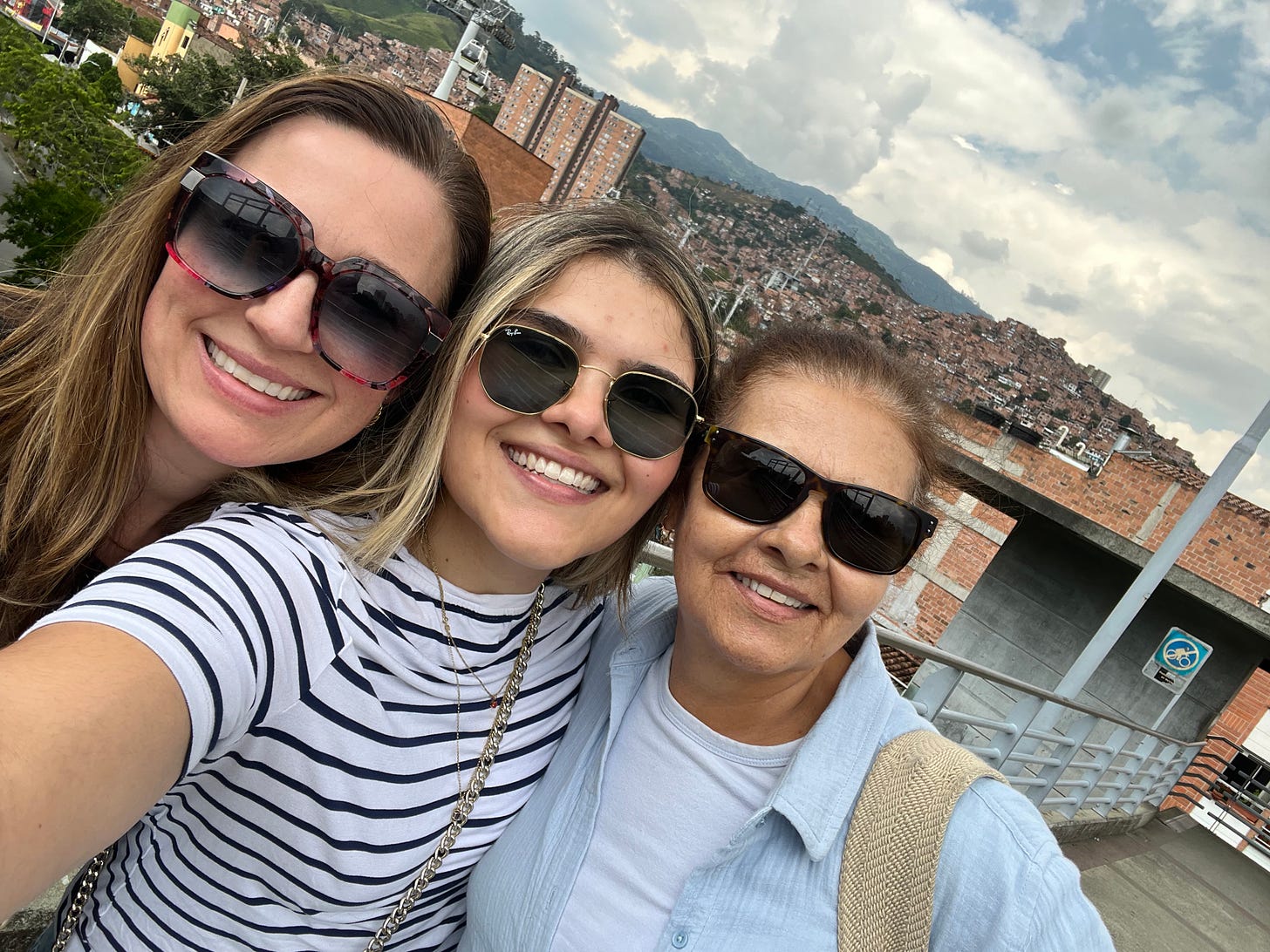Care benefits and work-cations
How can workplaces do their part to offer a little reprieve to caregivers - and in turn boost employee performance and morale?

Greetings from Medellin, Colombia. I’m here all week attending a Gender Lens Investing Forum, hosted by the global women’s development organization, Pro Mujer. People working in impact investing, philanthropy, government and social entrepreneurs are here to talk about how to catalyze more capital toward products, services, businesses that benefit and are run by women - and lead to greater gender equity.
Colombian gender-based violence survivor Natalia Ponce de León opened the event with her story about the horrific chemical attack she endured and how she has used her experience to advocate for policy change and support for women who are victims of such attacks. Yesterday I attended two care-economy focused sessions, and I still hope to meet with some of the amazing companies working to transform the lives of caregivers in Latin America. Today I’m moderating a learning circle on how to recognize and avoid gender bias in finance and investing. I can’t wait to share more about what I’ve learned this week in future newsletters. But first my social introvert self will need to rest because conferencing is exhausting, especially when it’s not in your native language!
The extra-special part of this trip is that Medellin is the home city of the amazing au pair who lived with us in Seattle for two years, who is still a dear friend (family!) She actually lives in Seattle - but she just so happens to be in Medellin too, and I’m staying with her and her wonderful parents for part of my trip. Melina is very loved by my children and has been an integral part of our care community. Now I get to experience her city with her and her wonderful family, and it is just the best. We visited the infamous Comuna 13, the hillside settlement that in the 80s and 90s was controlled by narcotraficos and home to Pablo Escobar. In the last decade it has reinvented itself as an artistic and cultural hotspot, with vibrant graffiti and hip pop everywhere. Melina arranged an incredible tour of the neighborhood’s graffiti with a charismatic guide named “el flaco” who showed us around, demonstrated his rapping skills, and treated us to amazing green mango and lime paletas. After my conference, we’ll visit the scenic town of Guatepé and make buñelos at Melina’s home with friends and family.
When you’re a caregiver, traveling for work can be as close as it gets to a vacation. There’s a saying among parents that when you travel as a family, no matter how amazing the location, “it’s not a vacation, it’s a trip.” It helps that I really love what I do, working with gender focused social impact organizations in Latin America. But beyond enjoying the work, for a few days I get to sleep uninterrupted in a hotel room, eat in restaurants with adults, and generally be a person in the world without the stress of getting to the next pickup, making sure everyone is fed, anticipating and thinking about others’ needs at any given moment. I miss my family deeply and struggle with both missing them and the guilt of being away for several days - AND also I enjoy it. Many very strong feelings coexist over an intense 5-7 day period. So on the one hand I’m escaping some caregiving stress, but on the other, the trips are usually not particularly relaxing. Either way, it’s a change of pace and scenery that is overall a very positive experience for me to have a few times a year. Huge props to my querido partner-in-care,
for holding down the fort - I couldn’t do it without him.After a whirlwind 5 days here, I’ll head back home to (most likely) a bit of chaos, and expect to pay the price when my kids let me know they are mad at me for being gone - in one way or another. Overall, it still feels like an important reset, a chance to be immersed in the things I love about my work as well as meet with colleagues that I only rarely see. Can anyone else relate to the concept of work-cations?
Workplace benefits and expectations
Some would argue that the pandemic-fueled movement to remote work has increased our isolation problem, which could then be used as a point in favor of return-to-work policies. As a caregiver I would never argue that employees be unnecessarily forced back into the office just for some vague and unfounded arguments about productivity, or even the benefits of “face-to-face” or community. Forcing butts in office chairs doesn’t create community in and of itself, and it can often amplify biases and power dynamics. On the other hand, I think we would benefit from supporting employees with flexible and updated options for community, including communities of care.
The lack of benefits and demonstrated empathy toward caregivers in the workplace costs companies. I already shared my story about the laughable “disability” leave I got when my first child was born. And I’m aware that many birth parents in the US don’t even get as much. Women are frequently going back to work two weeks after giving birth which has proven negative impacts on mother and child - and is cruel. But even beyond parental leave, what are organizations out there doing to support caregivers, and what could they be doing?
Dependent care tax programs have been around for a while - one of the few government-supported care benefits that gets administered through employers. There are a number of newer care benefits popping up in companies, and HR startups developed to help employers administer them. Fast company recently wrote about the role of employers in providing care benefits, in particular for the sandwich generation, which has typically not been acknowledged much at all, and definitely not in the workplace:
“Leaders should consider the role they play as part of employees’ care villages, particularly from a benefits perspective. It should function much like when companies introduce child care, pet insurance, wellness, and lifestyle offerings into the workplace. According to Care’s Future of Benefits Report, ‘46% of HR leaders reported they are prioritizing child care in 2023—and 43% are prioritizing senior care.’”
Employee flexibility is still the absolute first step in supporting employees who are also caregivers, but there are some interesting options popping up that will hopefully change norms toward more care support. Some employers are offering elder care support, pet care, household services, and other unique options. The benefits platform Fringe consolidates wellbeing benefits from a number of companies, and many are either related to care, or can help reduce the burden on caregivers. They include options for health services, food delivery, transportation, financial services and much more, and employees can choose what they want on a points system. Empathy partners with companies to provide grief and bereavement benefits and support to employees. In other parts of the world, there is increased support for menstrual and menopausal leave, which reduces stress and fatigue for sandwich caregivers.
Does your workplace offer any care benefits, beyond parental leave and disability?
It’s not just the role of workplaces to provide the benefits that will retain employees and therefore help the bottom line. But by cultivating an environment where care for family and loved ones is valued in and of itself, workplaces can contribute to the long game of reshaping our relationship with caregiving. The work of care itself is something to be valued, and while it may not be the direct company-related labor of employees, this shift would increase workplace equity, improve worker mental health, and therefore indirectly improve companies - but more importantly, communities and lives.
💪🏼 👏🏾 Nobel prize for research on women and work
Last but not least, Claudia Golden won the Nobel Prize in Economics the week before last for her research on women and work. Brava! She is only the third woman to win a Nobel Prize in Economics, and the first not to share it with male colleagues. Her work has shaped much of what we know about the gender pay gap, women’s historical participation in the labor market, and she uncovered how women’s earnings plateau and diverge from men’s after the birth of their first child - what is known as the “motherhood penalty.”
As always, please share your thoughts with me directly or in the comments!
📚 Reads (and a listen)
🎧 A MUST LISTEN: Ai-Jen Poo talks care on the We Can do Hard Things podcast!
As Washington’s Economy Booms, More Older Residents Live in Poverty
Walks, Tech, and Protein: How to Parent Your own Parents
XO, Anna







Aww, I love that you could hang in Medellín with Melina and her family. Iris and I will be visiting in late January — my first time back since 2010! (Back then there wasn't much to do in Laureles, so I'm amazed to see that now it's rated as the "coolest neighborhood of the world.")
https://www.timeout.com/travel/coolest-neighbourhoods-in-the-world